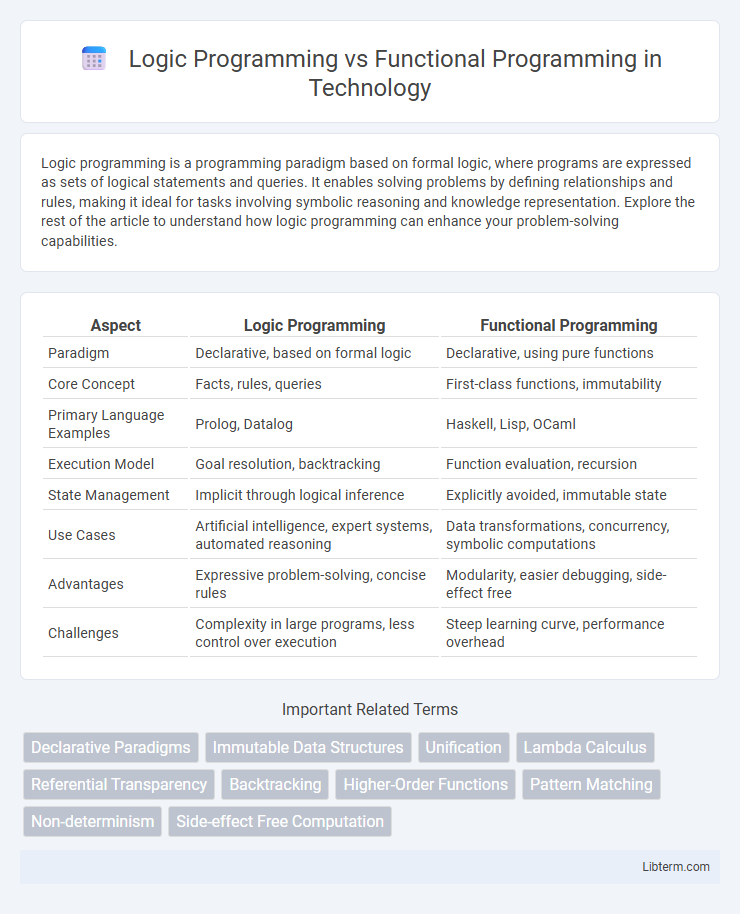Logic programming is a programming paradigm based on formal logic, where programs are expressed as sets of logical statements and queries. It enables solving problems by defining relationships and rules, making it ideal for tasks involving symbolic reasoning and knowledge representation. Explore the rest of the article to understand how logic programming can enhance your problem-solving capabilities.
Table of Comparison
| Aspect | Logic Programming | Functional Programming |
|---|---|---|
| Paradigm | Declarative, based on formal logic | Declarative, using pure functions |
| Core Concept | Facts, rules, queries | First-class functions, immutability |
| Primary Language Examples | Prolog, Datalog | Haskell, Lisp, OCaml |
| Execution Model | Goal resolution, backtracking | Function evaluation, recursion |
| State Management | Implicit through logical inference | Explicitly avoided, immutable state |
| Use Cases | Artificial intelligence, expert systems, automated reasoning | Data transformations, concurrency, symbolic computations |
| Advantages | Expressive problem-solving, concise rules | Modularity, easier debugging, side-effect free |
| Challenges | Complexity in large programs, less control over execution | Steep learning curve, performance overhead |
Introduction to Logic Programming and Functional Programming
Logic programming, exemplified by languages like Prolog, centers on formal logic to express facts and rules, enabling automated reasoning and problem-solving through queries. Functional programming, represented by languages such as Haskell and Lisp, emphasizes pure functions, immutability, and higher-order functions to create predictable and concise code. Both paradigms offer distinct approaches: logic programming supports declarative problem definitions via relations, while functional programming focuses on function composition and state-free computations.
Core Concepts of Logic Programming
Logic programming revolves around formal logic where programs consist of a set of facts and rules used to infer conclusions through queries. Core concepts include unification, which matches patterns between expressions, and backtracking, enabling systematic exploration of solution spaces for problem-solving. Unlike functional programming, which emphasizes functions and immutability, logic programming prioritizes declarative knowledge representation and automated reasoning.
Core Concepts of Functional Programming
Functional programming centers around pure functions, immutability, and first-class functions that enable declarative code expressing "what to solve" instead of "how to solve." Core concepts include higher-order functions, where functions take other functions as arguments or return them, and recursion as the primary mechanism for iteration. Lazy evaluation and stateless design facilitate easier reasoning about code, helping avoid side effects common in imperative paradigms.
Paradigm Philosophies: Declarative vs. Pure Functionality
Logic programming emphasizes declarative problem-solving by expressing knowledge and rules, allowing the system to infer conclusions through logical deduction. Functional programming centers on pure functionality, using immutable data and first-class functions to produce deterministic outputs without side effects. Both paradigms promote clarity and correctness but differ fundamentally in their approach to computation: logic programming relies on relations and inference, while functional programming utilizes mathematical function composition.
Syntax and Language Examples
Logic programming uses declarative syntax centered on facts and rules, exemplified by Prolog where statements like `parent(alice, bob).` define relations directly. Functional programming employs expressions and function composition, as seen in Haskell's syntax with functions such as `sum xs = foldl (+) 0 xs` emphasizing immutability. Logic syntax revolves around pattern matching and unification, whereas functional syntax focuses on recursion and higher-order functions.
Problem-Solving Approaches
Logic programming emphasizes declarative problem-solving by expressing knowledge and rules, allowing automatic inference to derive solutions from given facts and constraints. Functional programming relies on mathematical functions and immutability, promoting problem-solving through function composition and recursion to transform data consistently. Both paradigms optimize problem-solving by abstracting complexity, with logic programming excelling in rule-based inference and functional programming in state-free computation.
Application Domains and Use Cases
Logic programming excels in artificial intelligence, expert systems, and natural language processing due to its declarative nature and built-in inference mechanisms. Functional programming is widely used in data analysis, concurrent systems, and financial modeling because of its emphasis on immutability, higher-order functions, and ease of parallelization. Both paradigms offer distinct advantages, with logic programming suited for rule-based reasoning and functional programming optimized for scalable, predictable computations.
Performance and Scalability Considerations
Logic programming often excels in solving complex problems involving symbolic reasoning and rule-based queries but may face performance limitations due to backtracking and unification overhead. Functional programming emphasizes immutable data and stateless functions, enabling better optimization through parallelism and lazy evaluation, which enhances scalability in distributed systems. Performance in functional paradigms typically benefits from efficient memory usage and concurrency models, making it suitable for high-throughput applications demanding scalability.
Pros and Cons Comparison
Logic programming excels in solving complex problems involving rules and relationships, offering strong declarative syntax and built-in backtracking for automated search, but it may face performance challenges and steep learning curves. Functional programming provides immutability, first-class functions, and easier reasoning about code, enhancing concurrency and modularity, yet it can lead to verbose code and difficulties in handling stateful computations. Choosing between them depends on the problem domain, with logic programming suited for symbolic reasoning and constraint solving, while functional programming thrives in mathematical computations and parallel processing.
Choosing the Right Paradigm for Your Project
Logic programming excels in scenarios requiring complex rule-based reasoning, such as expert systems and artificial intelligence, by leveraging declarative syntax to express logical relations. Functional programming, characterized by pure functions and immutability, offers advantages in parallel processing, data transformation, and maintaining predictable code behavior, making it ideal for scalable applications and real-time data analysis. Selecting the right paradigm depends on project requirements: use logic programming for inference-heavy tasks and functional programming for efficient computation and maintainable codebases.
Logic Programming Infographic

 libterm.com
libterm.com